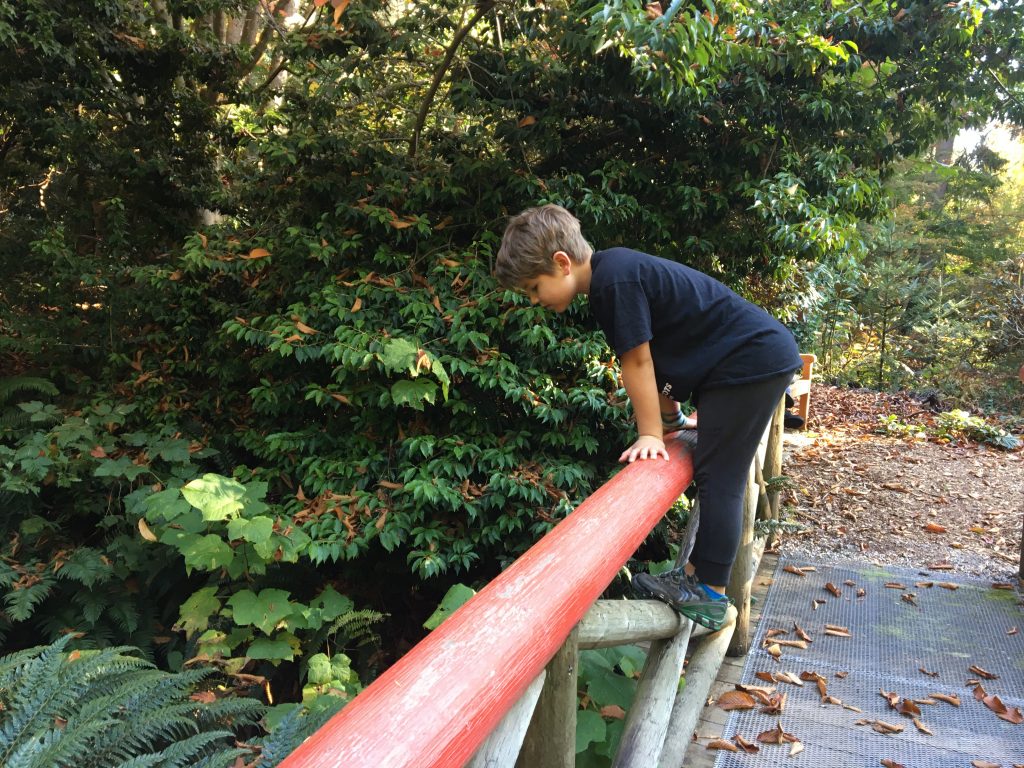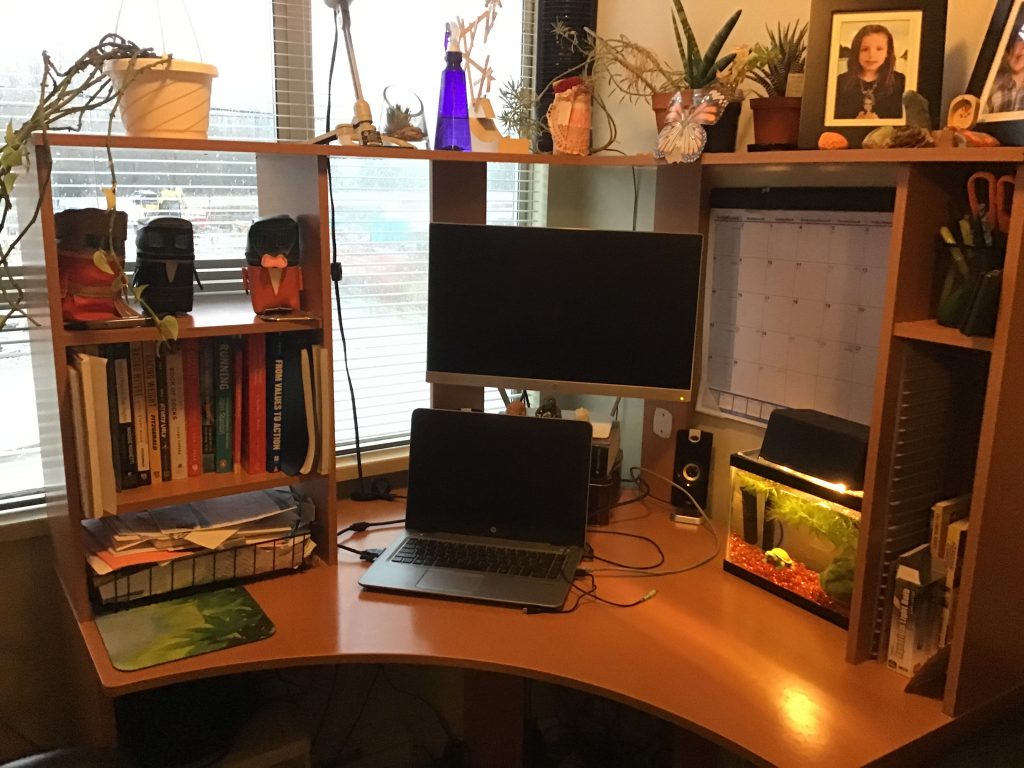1. Hey, can you please introduce yourself?
My name is Teresa and I am a native Californian currently living in Vancouver, Canada. I am the co-author of Working Remotely: Secrets to Success for Employees on Distributed Teams. When I’m not writing about remote work, I manage people and operations for Kaplan Test Prep. I’ve worked remotely since 2010. Some people may say that I have a chai addiction, but I say that I have a chai opportunity. When I’m not coming up with different spices to put in my tea, you can find me running, knitting, playing guitar, or spending time with my husband and two children.
I’ve lived in New York, Los Angeles, and the San Francisco Bay Area. While I can’t pick a favorite city, I can say that Vancouver has the best sushi, New York has the best nightlife, Los Angeles has the best sunsets, and the Bay Area has the best burritos. I’ll fight anyone who says differently.

2. What motivated you to choose remote working?
In the beginning, remote work chose me. I freelanced briefly right after finishing my MFA in Fiction, but soon settled into a management position in a traditional office in corporate America. Then one crisp fall day in 2010, I walked into a work meeting and found out that my entire division was going remote. I had two choices: I could interview for the remote version of my management role, or I could find a new job.
I could have looked for a different position, but I really loved my work tribe. There aren’t too many workplaces where quoting lines from The Princess Bride is normal. You can’t let that kind of quality interaction slip through your fingers. On top of that, I was seven months pregnant with my second child. I didn’t know if remote work would help me balance my personal and professional roles, but I was willing to take the leap to find out.

3. What were your initial months like? Did it live up to your expectations?
I would love to say that my first few months were a paradise of productivity and family togetherness, but I try not to lie in print. I lived in Los Angeles at the time, and I really enjoyed giving up my daily commute and monthly parking expenses. However, transitioning to my home based office came with challenges. I had a small child at home who didn’t understand that mom needed to work. I also didn’t have a separate office with a door that could lock, since our second bedroom started life as a dining room. It took time to train family out of constant interruptions, and time to find new ways to keep the kids out of my office space. I went to Starbucks a lot.
On a purely professional front, I spent more time trying to meet with my direct reports face-to-face than was helpful. About a month into remote work, I realized that I wasn’t helping my team make the transition to remote management. I was too busy trying to recreate an office experience. From that point on, I focused more time on building good remote communication and collaboration strategies, and my team thrived as a result.

4. How did you find remote working roles?
I’m still working for the same company that I started with twelve years ago, so I can’t answer this question if we’re talking about my life as an employee. As a freelance writer, I pitch work to publications. As a speaker, my clients find me through word of mouth, through my website and through my social media channels.

5. What have been the best, good and worst aspects of remote working for you?
Remote employment means never having to wear high heels for work again. And I absolutely love going for a run on my lunch break, secure in the knowledge that no one has to smell me when I get back.
Even though I love what I do, I’m not immune to getting frustrated at work. When this happens, I can literally mute my job and walk away from it all for a few minutes. That’s power.
Probably the worst thing about remote work is that people can’t always organically notice when you’re struggling. This is especially true if everyone is distracted because they are going through a tough time, like the situation we’re in due to coronavirus. Many years ago, I had a boss that wasn’t terribly supportive. It took me a long time to find a way to get help with my particular situation because I worked alone and hadn’t developed a trusting network of people I felt safe talking to. I would handle that situation differently today than I did at that time.
6. What tools do you swear by while working remotely?
My tools may be the least exciting thing about my remote day. I love Todoist because it keeps me on top of all the different things I’m working on. Between that and my Google calendar, I feel like I could run the world. I use Slack for instant messaging colleagues and contacts, Dropbox for managing my documents across my devices, and four different video apps. Not everybody uses Zoom, so I also use Whereby, Google Hangouts, and Skype for my video needs.
The biggest, most vital tool I use is my pause button. Our devices give us the opportunity to stay connected 24/7, but that doesn’t mean we should be connected all the time. I am as guilty as anyone of scrolling through emails, tweets, and likes at all hours, unless I pause my notifications.
7. Your most exciting/ hilarious experience since you started working remotely.
There have been so many! It’s weird, but even highly educated, tech savvy people can have a hard time remembering that the people staring at you from the screen are ‘real’. At the very beginning of my remote career, I took a lot of video calls at Starbucks because I didn’t have a quiet place at home. One day I was on with my boss, discussing our plan for the next month, when an elderly gentleman came over and asked me what I was doing. I politely told him I was on a video call with my boss, expecting that he would leave me to it.
He didn’t. Instead, a big smile spread across his face as he told me that his grandchildren lived overseas, and he missed seeing their faces so much, and could I write down what I was using to make a video call so he could see his grandkids again. While he was talking, he commented on how easy it was to see the person on the screen, as if my boss couldn’t hear him talking. Granted, I was wearing headphones, but it was still rude to talk about someone who was right there. To that gentleman, my boss was little more than an image on the television.
8. What is your golden advice to a new remote worker?
Aristotle once said “Through discipline comes freedom”. Remote work provides an unparalleled opportunity to create a bespoke life. However, you won’t create that life if you don’t put in some constraints that will get you there.
Pick a consistent start and end time, and stick to them as much as you reasonably can. You will be surprised at how much you can get done if you know that you will log off at a certain time no matter what. And putting in a productive day will let you feel good about unplugging from work during your designated personal time.
According to Buffer’s annual survey about the state of remote work, unplugging from work and loneliness are some of the top struggles of remote workers. The better you get at sticking to your schedule, the better you will be at unplugging from work.
9. How do you see your career shaping up and your goals?
I am a terminally curious person, so this question has a lot of possible answers. The one thing I know for sure is that I want to stay remote. My career currently has two main streams – I work in management and I write about remote work and other business topics. The only way I can manage the two while also participating in my home life is by taking full advantage of the flexibility and time savings I enjoy because I work in the same place that I live.
There are three other books waiting in the back of my mind (and in a file on my laptop) to be written. Two of them are non fiction, and one of them is about remote work. One of them is at the research stage, and one I’m writing now.
I don’t see myself giving up my day job to write full time. To be perfectly honest, I’d rather struggle to find time to write rather than struggle to contribute to my family’s budget with my writing. Fortunately I really like managing people and troubleshooting processes, and I like thinking about how to do these things well. This in turn gives me ideas to write about, so it’s all one big virtuous circle.
10. How do you expect remote working to evolve in the future?
Before we can talk about what the future holds for remote work, we have to pause to acknowledge coronavirus. The COVID19 pandemic has changed the face of knowledge work in ways that haven’t yet been fully realized.
Companies that hadn’t considered or actively avoided a remote work setup were forced to make the leap on short notice. The experience that managers, leaders, and employees have working remotely for the first time will be colored by how their company managed the initial transition, and the months that followed.
Was leadership most concerned with supporting workers or micromanaging them? Did the company take the opportunity to iterate work practices to fit the new pandemic reality, or did it attempt to slavishly recreate the physical office in a virtual environment?
Ultimately, whether a company considers its remote work experiment to be a success or failure will depend on a variety of factors. But the way the company handled the people aspects of remote work is a very significant factor.
On an individual level, the pandemic has functioned like Pandora with her box of plagues. Knowledge workers with varying personal circumstances have had to learn to work in their homes. And they won’t unlearn those skills once the pandemic is over. Experienced remote workers have already built basic remote work skills, but working while confined at home – alone or with family – will leave a lasting impression.
At the end of this, some people will gladly go back to a traditional office set up. But they may find that their place of work looks different. Companies are always seeking ways to take expenses out of the business. If employees can work from home at least part of the time, leaders may choose to lease smaller office spaces in the name of cost savings.
Workers with vibrant personal or professional lives may wish to work from home part time so they can use the time savings to pursue passion projects or connect with family. Persons who already worked from home full time may make more of an effort to work in public spaces such as coffee shops or libraries because home feels too confining.
Real estate itself may undergo a transformation. If people are working from home more often, developers may start to include comprehensive coworking spaces as part of an apartment complex’s amenities. In that scenario, the concept of who your coworkers are will expand to include the neighbors who share your complex’s coworking space.
11. Where can we follow you on?
You can follow me on:
Twitter
Facebook
LinkedIn
Are you a remote worker too?
Would you like to share you story?
Just reach us at hrishikesh@remote.tools!